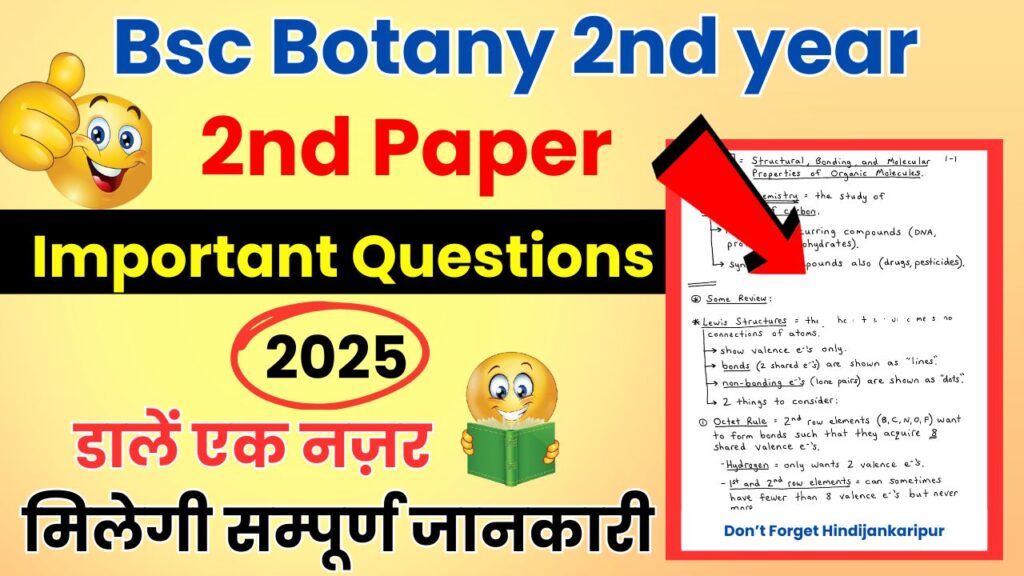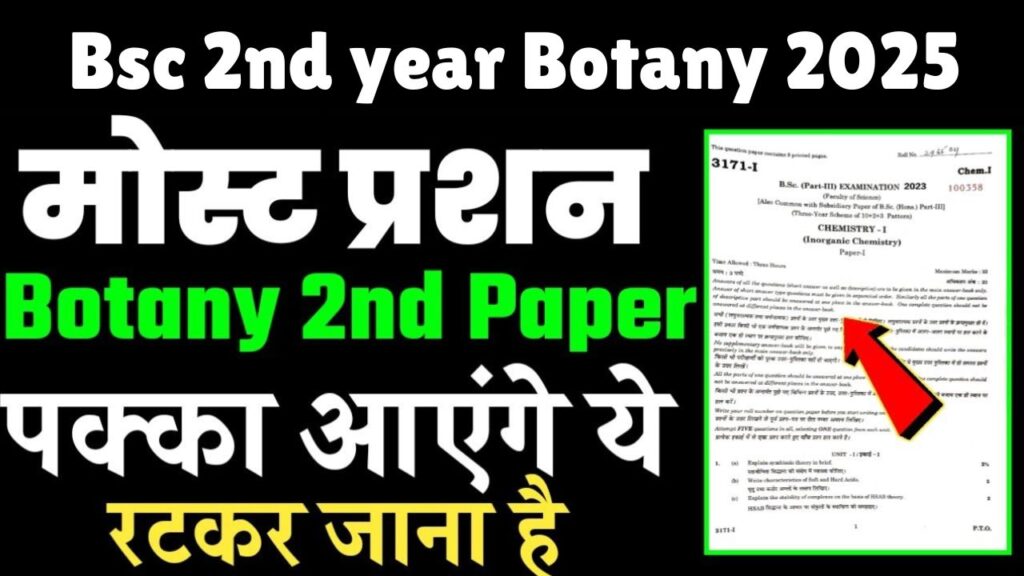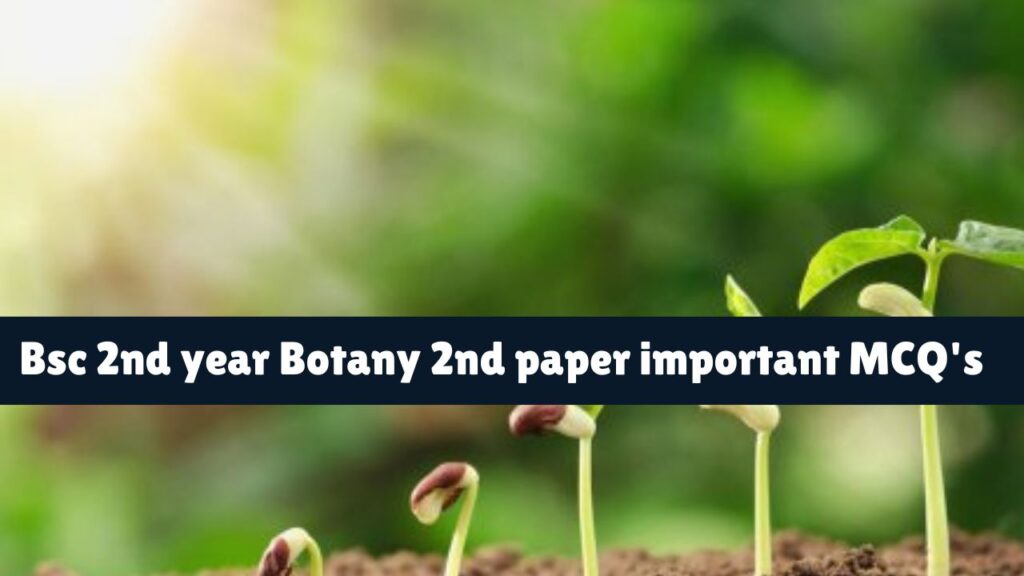नमस्कार साथियों क्या आप जानना चाहते है Bsc 2nd year Botany 2nd paper important Questions 2025 के बारे में? दोस्तों आपका स्वागत है इस लेख में, हम आपको Bsc Botany 2nd paper important Questions 2025 के साथ Bsc 2nd year Botany 2nd paper important Questions 2025 in Hindi के बारे में सब कुछ बताएंगे।

जैसा कि आप जानते हैं Chemistry एक बहुत ही दिमाग लगाने वाला subject है, तो इस लेख में हमने Bsc 2nd year Botany 2nd paper important Questions 2025 इकट्ठा किया है जो कि आपको पढ़ने में मदत करेंगे अगर आप इस लेख में बताए हुए Important Questions को एक बार रट लेंगे तो आप समझ लो 60% syllabus cover हो जाएगा, तो Bsc 2nd year Botany 2nd paper important Questions 2025 की पूरी सूची पढ़ने के लिए इस लेख को अंत तक जरूर पढ़ें ।
यह Bsc 2nd year Botany 2nd paper के महत्वपूर्ण प्रश्न 2024 प्रतिष्ठित संस्थानों के अनुभवी शिक्षकों द्वारा तैयार किए गए हैं, इन प्रश्नों के पेपर में आने की अधिक संभावना है, इसलिए इन्हें अच्छी तरह से तैयार करें।
Contents
- Bsc 2nd year Botany 2nd paper important Questions 2025
- Bsc 2nd year Botany 2nd paper important MCQ’s
- 1. The primary pigment involved in photosynthesis is:
- 2. Kranz anatomy is a characteristic feature of:
- 3. The plant hormone responsible for seed dormancy is:
- 4. Which is a non-vascular plant group?
- 5. During glycolysis, glucose is converted into:
- 6. Which enzyme is crucial for CO₂ fixation in the Calvin cycle?
- 7. The functional unit of the chloroplast is:
- 8. Which of the following is an example of a xerophyte?
- 9. Double fertilization is unique to:
- 10. Which of the following is a nitrogen-fixing cyanobacterium?
- 11. The main food storage in fungi is:
- 12. Which of the following structures is haploid in the plant life cycle?
- 13. The enzyme that breaks down cellulose is:
- 14. Which gas is released during photosynthesis?
- 15. Which plant tissue is responsible for the transport of water?
Bsc 2nd year Botany 2nd paper important Questions 2025

Describe the process of photosynthesis in detail, highlighting light and dark reactions.
(प्रकाश संश्लेषण की प्रक्रिया का विस्तार से वर्णन करें, प्रकाश और अंधकार अभिक्रियाओं को समझाते हुए।)
What is photophosphorylation? Differentiate between cyclic and non-cyclic photophosphorylation.
(फोटोफॉस्फोराइलेशन क्या है? चक्रीय और अचक्रीय फोटोफॉस्फोराइलेशन में अंतर करें।)
Explain Kranz anatomy and its significance in C₄ plants.
(क्रैंज एनाटॉमी का वर्णन करें और इसे C₄ पौधों में इसके महत्व को समझाएं।)
What are plant growth regulators? Discuss their types and functions.
(पौध विकास नियामक क्या हैं? उनके प्रकार और कार्यों पर चर्चा करें।)
What is glycolysis? Write its steps and significance.
(ग्लाइकोलाइसिस क्या है? इसके चरण और महत्व लिखें।)
Explain the nitrogen cycle and the role of microorganisms in nitrogen fixation.
(नाइट्रोजन चक्र का वर्णन करें और नाइट्रोजन स्थिरीकरण में सूक्ष्मजीवों की भूमिका समझाएं।)
Discuss the structure and function of mitochondria.
(माइटोकॉन्ड्रिया की संरचना और कार्यों पर चर्चा करें।)
What is photorespiration? Compare it with normal respiration.
(फोटोरेस्पिरेशन क्या है? इसे सामान्य श्वसन से तुलना करें।)
Describe the Calvin cycle with the help of a diagram.
(एक आरेख की मदद से कैल्विन चक्र का वर्णन करें।)
Write short notes on CAM plants and their adaptations to arid environments.
(CAM पौधों और शुष्क पर्यावरण में उनके अनुकूलन पर संक्षेप नोट्स लिखें।)
What are macronutrients and micronutrients? Explain their roles in plant growth.
(मैक्रोन्यूट्रिएंट्स और माइक्रोन्यूट्रिएंट्स क्या हैं? पौधों की वृद्धि में उनकी भूमिकाओं को समझाएं।)
Describe the mechanism of water absorption in plants.
(पौधों में जल अवशोषण की प्रक्रिया का वर्णन करें।)
Explain the role of RuBisCO in carbon fixation.
(कार्बन स्थिरीकरण में RuBisCO की भूमिका समझाएं।)
What is transpiration? Explain its types and factors affecting transpiration.
(वाष्पोत्सर्जन क्या है? इसके प्रकार और इसे प्रभावित करने वाले कारकों को समझाएं।)
What are the differences between aerobic and anaerobic respiration?
(एरोबिक और अनएरोबिक श्वसन में क्या अंतर है?)
Bsc 2nd year Botany 2nd paper important MCQ’s

1. The primary pigment involved in photosynthesis is:
- A) Chlorophyll b
- B) Carotene
- C) Chlorophyll a
- D) Xanthophyll
Answer: C) Chlorophyll a
Explanation: Chlorophyll a is the primary photosynthetic pigment responsible for capturing light energy and initiating the photosynthesis process.
2. Kranz anatomy is a characteristic feature of:
- A) C₃ plants
- B) C₄ plants
- C) CAM plants
- D) Algae
Answer: B) C₄ plants
Explanation: C₄ plants like maize and sugarcane exhibit Kranz anatomy, where bundle sheath cells are specialized for the Calvin cycle.
3. The plant hormone responsible for seed dormancy is:
- A) Auxin
- B) Gibberellin
- C) Abscisic acid
- D) Cytokinin
Answer: C) Abscisic acid
Explanation: Abscisic acid (ABA) induces and maintains seed dormancy by inhibiting growth and metabolic activities.
4. Which is a non-vascular plant group?
- A) Bryophytes
- B) Pteridophytes
- C) Gymnosperms
- D) Angiosperms
Answer: A) Bryophytes
Explanation: Bryophytes lack vascular tissues (xylem and phloem) and are considered non-vascular plants.
5. During glycolysis, glucose is converted into:
- A) Pyruvate
- B) Acetyl-CoA
- C) Ethanol
- D) Lactic acid
Answer: A) Pyruvate
Explanation: Glycolysis is the metabolic pathway that breaks down glucose into two molecules of pyruvate, producing ATP and NADH.
6. Which enzyme is crucial for CO₂ fixation in the Calvin cycle?
- A) RuBisCO
- B) ATP synthase
- C) Hexokinase
- D) PEP carboxylase
Answer: A) RuBisCO
Explanation: RuBisCO (Ribulose-1,5-bisphosphate carboxylase/oxygenase) is the key enzyme in the Calvin cycle, fixing CO₂ into organic molecules.
7. The functional unit of the chloroplast is:
- A) Cristae
- B) Grana
- C) Stroma
- D) Thylakoid
Answer: D) Thylakoid
Explanation: Thylakoids are the structural and functional units of chloroplasts where light-dependent reactions occur.
8. Which of the following is an example of a xerophyte?
- A) Hydrilla
- B) Cactus
- C) Mango
- D) Lotus
Answer: B) Cactus
Explanation: Xerophytes, like cacti, are adapted to arid environments with modifications like spines and thick cuticles to minimize water loss.
9. Double fertilization is unique to:
- A) Algae
- B) Bryophytes
- C) Gymnosperms
- D) Angiosperms
Answer: D) Angiosperms
Explanation: Double fertilization, where one sperm fertilizes the egg and the other fuses with polar nuclei to form the endosperm, occurs only in angiosperms.
10. Which of the following is a nitrogen-fixing cyanobacterium?
- A) Nostoc
- B) Spirogyra
- C) Chlamydomonas
- D) Ulva
Answer: A) Nostoc
Explanation: Nostoc is a cyanobacterium capable of fixing atmospheric nitrogen, converting it into forms usable by plants.
11. The main food storage in fungi is:
- A) Glycogen
- B) Starch
- C) Cellulose
- D) Fructose
Answer: A) Glycogen
Explanation: Fungi store carbohydrates as glycogen, similar to animals, rather than starch like plants.
12. Which of the following structures is haploid in the plant life cycle?
- A) Sporophyte
- B) Zygote
- C) Gametophyte
- D) Seed
Answer: C) Gametophyte
Explanation: Gametophytes are the haploid stage in the alternation of generations, producing gametes by mitosis.
13. The enzyme that breaks down cellulose is:
- A) Amylase
- B) Cellulase
- C) Lipase
- D) Protease
Answer: B) Cellulase
Explanation: Cellulase breaks down cellulose into glucose, aiding in the digestion of plant cell walls.
14. Which gas is released during photosynthesis?
- A) Carbon dioxide
- B) Oxygen
- C) Nitrogen
- D) Methane
Answer: B) Oxygen
Explanation: Oxygen is released as a by-product of photosynthesis during the splitting of water molecules in the light-dependent reactions.
15. Which plant tissue is responsible for the transport of water?
- A) Phloem
- B) Xylem
- C) Parenchyma
- D) Collenchyma
Answer: B) Xylem
Explanation: Xylem is the vascular tissue responsible for the upward transport of water and minerals from roots to other parts of the plant.
हमें उम्मीद है कि इस लेख की मदद से आपको Bsc 2nd year Botany 2nd paper important Questions 2025 के बारे में जानकारी मिल गई होगी।
दोस्तों आपको यह पोस्ट कैसी लगी कृपया हमें कमेंट सेक्शन में बताएं और यदि आपके कोई प्रश्न हों तो बेझिझक हमसे Comment Box में पूछ सकते हैं। यदि आपको यह पोस्ट उपयोगी लगी तो कृपया इसे दूसरों के साथ साझा करें।